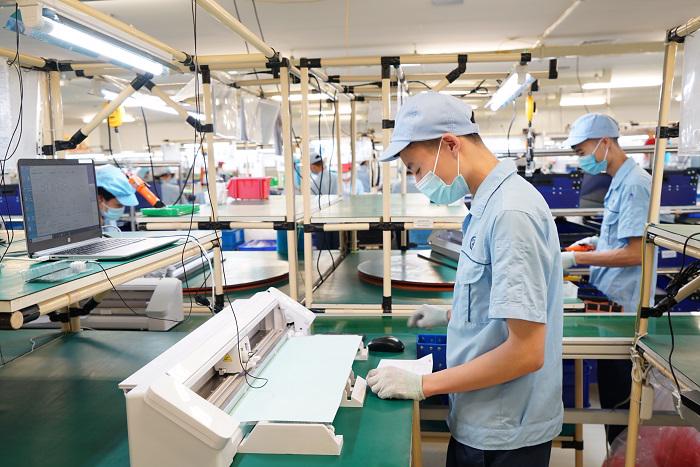Vietnam a focus of intra-Asian investors: HSBC
As early as 2023, a growing number of global intra-Asian multinationals are looking to either expand or make new investments in the country.
Intra-Asian multinational companies, those making a big part of FDI firms operating in Vietnam, continue to put Vietnam in their focus.
| Electronics production at Rhythm Precision Vietnam in Noi Bai Industrial Park. Photo: Pham Hung |
Joonsuk Park, head of International Subsidiary Banking and Wholesale Banking at HSBC Vietnam, shared his view on the dynamics of an intra-Asia FDI flow to the country.
According to Park, FDI flows into Vietnam play a quintessential role and contributes to the growth story of the country.
“Foreign Direct Investments have been one of the key catalysts spurring and transforming Vietnam into one of the most open economies in the region,” stated Park.
Multinationals looking to expand operation
A study by HSBC showed that FDI investors or regional and global multinational companies operating in Vietnam effectively contribute to more than 80% of total exports from Vietnam and more than 25% of local investment. Among these multi-national companies (MNCs), the intra-Asian MNCs make up the majority.
Vietnam's top exports include mobile phones, electronic goods, general machinery, garments, footwear, and wood products, and of all these sectors, Asian multinationals play an integral part, namely South Korea, China, Hong Kong, Taiwan, Japan, Thailand, and Singapore.
Park suggested that the value of attracting the intra-Asian multinationals also means that Vietnam is not only moving up the value-added ladder in terms of export products but also simultaneously expanding the depth and breadth of the domestic consumption market.
"These top intra-Asian investors continue to focus on Vietnam," he noted.
“Following and supporting the flow of intra-Asian capital flow as part of our pivot to Asia strategy, HSBC has been providing advisory and treasury support to many multinational companies entering and operating in Vietnam and we are pleased to see the annual investment in-flows remain steady,” he continued.
In 2023, HSBC noted it has witnessed interest from several global intra-Asian multinationals engaging across a wide array of sectors including retail, semiconductors, electronics, mobile parts, plastics, renewables, and logistics, looking to either expand or invest newly into the country.
In particular, Thai investors are looking to invest and expand operations in the feed mill, packaging, retail, manufacturing, and chemical sectors "based on medium to long-term growth prospects in a market with the right elements for growth."
Role of intra-Asia’s FDI flows
Park said as has been the case for many countries and markets, Covid-19 has also impacted Vietnam in one way or another. Looking at newly registered FDIs in the country, Vietnam experienced a roughly 25% drop from 2019 to 2020. In 2021, the numbers remained flat whilst, in 2022, the investments further slightly deteriorated.
While there are multiple reasons behind this, Park said Covid-19 had delayed investment decisions for many multinational companies globally.
He noted that the country's early opening at the end of 2021 has not led to immediate FDI inflows.
In addition, investment planning and decisions simply take time, not to mention that Vietnam has also become more selective in attracting higher value-added investments, as opposed to the indiscriminate past, Park said.
On top of these complications, heightened geopolitical risk, rising inflationary pressures, rising borrowing costs, and the global trade slowdown are further weighing on the investment decisions of regional and global multinational treasurers and CFOs, he continued.
“Irrespective, the mid to long-term view remains solid. Many prospects and existing FDI investors harbor the view that Vietnam will continue to benefit owing to an established manufacturing ecosystem in place, cost competitiveness, a rising number of skilled workers, progressive regulatory support, affluence, and the growing middle-income story as well as from the China+1 leverage,” he said.
HSBC forecasts that Vietnam’s GDP will grow by 5.8% in 2023. Nevertheless, headwinds remain strong. The global trade recession impacts Vietnam’s exports, the elevated inflation deters domestic consumption and whilst the re-opening of China is expected to positively impact Vietnam across FDI inflows, exports, and receipt of tourism, it will be a challenging year.
“Replenishing the FDI flow back into Vietnam is of critical importance for both export and the domestic consumption market growth. And the intra-Asian flow cannot be underestimated,” Park asserted.
Hanoi records $37 million FDI in two months In February, Hanoi granted licenses to 14 new FDI projects with a total registered capital of $8 million. In addition, three projects increased their investment capital, adding $2.3 million in registered capital. Foreign investors also contributed capital, buying shares 17 times for a total of $4 million. Overall, the city attracted a total of $36.7 million in FDI in the first two months of 2023. This included 39 new projects with registered capital of $10.9 million, as well as 12 existing projects that increased their investment capital by $16.5 million. Foreign investors also contributed capital and bought shares 41 times, amounting to $9.3 million. As of February 20, 2023, the Ministry of Planning and Investment reports that foreign investors have contributed a total of almost $3.1 billion in newly registered capital, adjusted and contributed capital to purchase shares, and purchase capital contribution (GVMCP). These investments have been made in 17 out of the 21 national economic sectors, with the processing and manufacturing industry being the most popular, accounting for 70.1% of the total investment, or over $2.17 billion. The real estate sector comes in second with a total investment of almost $396.9 million, comprising 12.8% of the total registered investment capital. Other sectors attracting foreign investment include wholesale and retail industries, with a total registered capital of around $202.1 million, and transportation and warehousing, with a total investment of nearly $141.9 million. |













